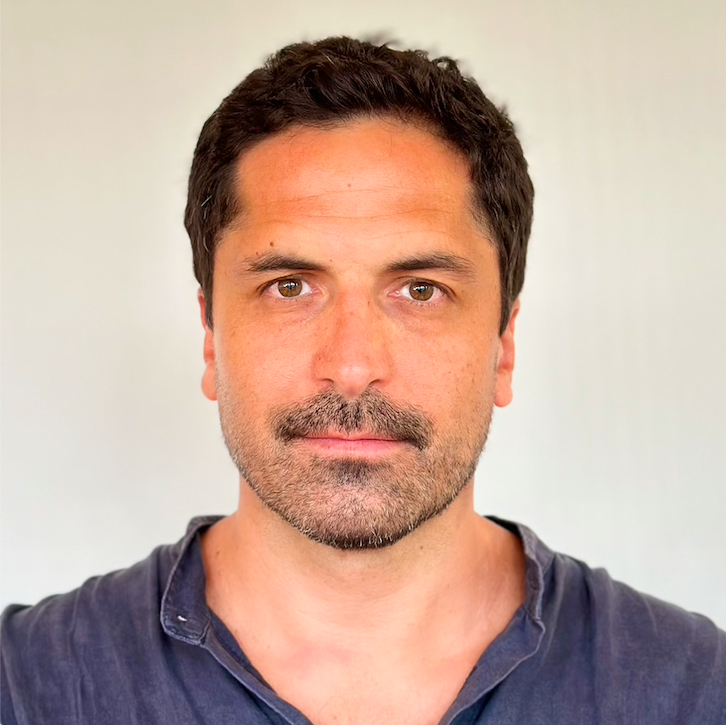
Hugo Palmarola se especializa en Ciencia-Tecnología-Sociedad (CTS), Curaduría, Diseño Crítico, Diseño y Democracia, Estudios del Espacio Exterior, Estudios Latinoamericanos, Historia de la Arquitectura, Historia de la Carrera Espacial, Historia de la Tecnología, Historia del Cine, Historia del Diseño, Museografía, Prototipado
Profesor Asociado
hpalmaro@uc.clProfesor asociado de la Escuela de Diseño de la Pontificia Universidad Católica de Chile (UC). Diseñador UC (2004), reconocido con el premio de mejor alumno de la promoción. Es doctor en Estudios Latinoamericanos de la Universidad Nacional Autónoma de México, con una investigación que obtuvo el premio de ensayo doctoral de la Design History Society de Reino Unido (2018).
Palmarola obtuvo el León de Plata de la Bienal de Arquitectura Venecia por el Pabellón de Chile Monolith Controversies, curado junto a Pedro Alonso (2014), y por su libro complementario (Hatje Cantz, 2014) recibieron el DAM Architectural Book Award del Deutsches Architekturmuseum (2014). Su proyecto Monolith Controversies forma parte de la exposición permanente del Museo de la Memoria y los Derechos Humanos en Santiago (desde 2018).
Palmarola y Alonso publicaron el libro Panel (Architectural Association, 2014); curaron la exposición Flying Panels: How Concrete Panels Changed the World en The Swedish Centre for Architecture and Design (ArkDes) en Estocolmo (2019-2020); y publicaron un libro bajo el mismo título (Dom Publishers, 2019). Junto a Alonso, ha sido investigador Fondecyt en proyectos sobre los observatorios soviéticos Pulkovo y las estaciones satelitales de la NASA (2015-2021).
Palmarola obtuvo el fondo MIT International Science & Technology Initiatives (MISTI) (2021-2023), con Eden Medina y Pedro Alonso. Junto a ellos curó la exposición Cómo diseñar una revolución: La vía chilena al diseño en el Centro Cultural La Moneda (2023-2024); realizó la primera reconstrucción integral y funcional de la sala de operaciones del proyecto cibernético Cybersyn de 1973 (2023); y publicó el libro How to Design a Revolution: The Chilean Road to Design (Lars Müller Publishers, 2024).
Textos de Palmarola fueron seleccioados para los libros Beyond Imported Magic. Essays on Science, Technology, and Society in Latin America (MIT Press, 2014) y Extinct: A Compendium of Obsolete Objects (Reaktion Books, 2021). Palmarola ha sido becario y miembro en The Society for the History of Technology de Estados Unidos (2008) y en UC obtuvo la beca Top China (2019) y el premio a la Creación Artística (2020).
Associate Professor at the School of Design of the Catholic University (UC).
UC Designer (2004), recognized with the prize of best student of the promotion. He holds a PhD in Latin American Studies from the National Autonomous University of Mexico, with a research that won the doctoral essay award from the Design History Society of the United Kingdom (2018).
Palmarola won the Silver Lion of the Venice Architecture Biennale for the Chilean Pavilion Monolith Controversies, curated with Pedro Alonso (2014), and for their complementary book (Hatje Cantz, 2014) they received the DAM Architectural Book Award from the Deutsches Architekturmuseum (2014). Monolith Controversies is part of the permanent exhibition of the Museum of Memory and Human Rights in Santiago (since 2018).
Palmarola and Alonso published the book Panel (Architectural Association, 2014); curated the exhibition Flying Panels: How Concrete Panels Changed the World at The Swedish Centre for Architecture and Design (ArkDes) in Stockholm (2019-2020); and published a book under the same title (Dom Publishers, 2019). Alongside Alonso, he has been a Fondecyt researcher on projects on the Soviet Pulkovo observatories and NASA’s satellite stations (2015-2021).
Palmarola obtained the MIT International Science & Technology Initiatives (MISTI) fund (2021-2023), with Eden Medina and Pedro Alonso. Alongside them, he curated the exhibition How to Design a Revolution: The Chilean Road to Design at the Centro Cultural La Moneda (2023-2024); carried out the first comprehensive and functional reconstruction of the operations room of the 1973 cybernetic project Cybersyn (2023); and published the book How to Design a Revolution: The Chilean Road to Design (Lars Müller Publishers, 2024).
Palmarola’s texts were selected for the books Beyond Imported Magic: Essays on Science, Technology, and Society in Latin America (MIT Press, 2014) and Extinct: A Compendium of Obsolete Objects (Reaktion Books, 2021). Palmarola has been a fellow and member of The Society for the History of Technology of the United States (2008) and at UC he was awarded the Top China scholarship (2019) and the Prize for Artistic Creation (2020).
